Featured
Post Endorsements for City Council and Schools

The Oakland Post has endorsed candidates for five seats on the City Council, looking for leaders who are dynamic and visionary, have a track record of compassion and solidarity with neighborhoods in need, and are capable of working collaboratively with all parts of the city.
Endorsed candidates were: At-Large – Rebecca Kaplan; District 1 – incumbent Dan Kalb; District 3 – Carroll Fife; District 5 – incumbent Noel Gallo; and District 7 — Treva Reid (first choice) and Aaron Clay (second choice);
Oakland Post panelists in the recent interviews were Clarence Thomas, former secretary-treasurer of International Longshore and Warehouse Union Local 10 (retired); Cathy Leonard, founder of Oakland Neighborhoods for Equity and steering committee member of the Coalition for Police Accountability; Zappa Montague, teacher and long-time activist; Walter Riley, civil rights attorney; Dr. Kimberly Mayfield, dean of the School of Education at Holy Names University; and Kitty Kelly Epstein, education professor and host of a show on Radio Station KPFA 94.1 FM.
Panelists directed their questions to several of the deep concerns of local residents that are covered regularly in the pages of the Oakland Post. One issue was whether the candidates support real estate developer John Fisher’s proposal to buy the Oakland Coliseum property in East Oakland and take over Port of Oakland public property in West Oakland to build high-end luxury condominiums, a mall and a baseball stadium.
Candidates were asked if they have a comprehensive plan for housing Oakland residents including the homeless and the housing insecure.
Finally, panelists wanted to know the candidates’ comprehensive plan to resolve the city’s decades-long policing crisis: excessive overtime and cost overruns, and inability to comply with federal court racial justice requirements.
Here are the Post endorsements.
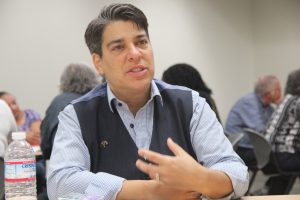
Rebecca Kaplan
Councilmember at Lage: Rebecca Kaplan, has supported many of the issues that are of particular importance to the African American community and people of color throughout this city.
Her leadership has been crucial on housing and tenant rights, police reform and an end to racial profiling, to improved air quality and toxics cleanup.
Her efforts have earned her the respect of many and the hostility of a few.
Kaplan is accessible and responsive to input. Her opponent has no experience in public office and sometimes seems confused by the issues.
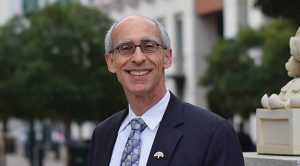
Dan Kalb
District 1: Dan Kalb has served on the City Council since 2013. He has worked hard to create a strong police commission to oversee the Oakland Police Department. He has also collaborated with fellow councilmembers to create policies for affordable housing and tenant protections.
People in his district have raised that they do not find Kalb accessible. We hope that is something he will change.
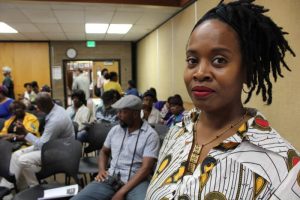
Carroll Fife
District 3: Carroll Fife is a candidate who represents real reform in city government and has programs and a track record of working for practical, systemic changes in housing, jobs, racial justice, health and public safety.
Though she has never held or run for public office before, she is well known for her work in the neighborhoods and at City Council by staff and elected officials for years of work on behalf of the community on many of the most important issues in Oakland.
She was a strong community advocate for the fight to create Oakland’s Department of Race and Equity. She has worked for jobs and training resources for unemployed and job-seeking West Oakland residents. She advocated for Moms for Housing, and she has fought foreclosures and evictions.
Fife has a plan for innovative strategies for housing local residents, to help those who are fighting to stay in Oakland and to bring home those who want to come back to the city.
She has a plan to rethink criminal justice: improve public safety while reducing police costs and overtime, utilizing mental health and other supportive resources.
District 3 is severely impacted by housing displacement and a tremendous increase in unhoused individuals. She has a plan to address this tragedy in West Oakland.
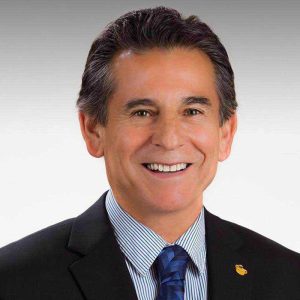
Noel Gallo
District 5: Noel Gallo
Noel Gallo has served on the council since 2013. He formerly served on the school board. For years, he has organized neighbors to hold trash and waste cleanups in District 5 every weekend.
He has raised critiques of the Howard Terminal stadium project and opposed selling the Oakland Coliseum property to a private developer. He has been a long-time advocate of utilizing public land for the public good.
Standing up to resistance, Gallo was one of the council members who worked tirelessly to help create a police commission to promote public oversight of the police department. He has a reputation for being very accessible to his constituents. While serving together on the Oakland School Board, Post publisher Cobb and Noel Gallo led the fight for funding for La Escuelita Elementary School.
Members of the Post endorsement panel appreciated a lot of ideas of District 5 challengers Richard Santos Raya and Zoe Lopez-Meraz and hope they will stay engaged in the public dialogue.

Treva Reid
District 7: Treva Reid (first choice endorsement) is a newcomer to elected office and appears to be very accessible and thoughtful.
A graduate of Hampton University, she has worked as a Senior Field Representative for then Assemblymember (now State Senator) Nancy Skinner, She advocated for housing policies, gun violence prevention, job training programs and legislation for incarcerated and formerly-incarcerated individuals.
She serves as an Associate for Assembly District 18 on the Alameda County Democratic Central Committee and is an Emerge California Alumna. She is also a ministry leader at Shiloh Church in Oakland. During the campaign, she has exhibited a grasp of the totality of issues affecting the city and which council members must confront. The Post publisher was impressed with her voluntarism and church community service activities.
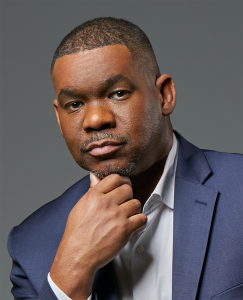
Aaron Clay
Aaron Clay (second choice endorsement) has a strong understanding of the issues and is very forthright about the need to protect public land for the public good.
He is a graduate of Morehouse College and Loyola University of Chicago Law School. His mother worked for over 30 years as a librarian in Oakland schools.
He serves on the board of the nonprofit Youth UpRising in East Oakland.
Alameda County
Seth Curry Makes Impressive Debut with the Golden State Warriors
Seth looked comfortable in his new uniform, seamlessly fitting into the Warriors’ offensive and defensive system. He finished the night with an impressive 14 points, becoming one of the team’s top scorers for the game. Seth’s points came in a variety of ways – floaters, spot-up three-pointers, mid-range jumpers, and a handful of aggressive drives that kept the Oklahoma City Thunder defense on its heels.

By Y’Anad Burrell
Tuesday night was anything but ordinary for fans in San Francisco as Seth Curry made his highly anticipated debut as a new member of the Golden State Warriors. Seth didn’t disappoint, delivering a performance that not only showcased his scoring ability but also demonstrated his added value to the team.
At 35, the 12-year NBA veteran on Monday signed a contract to play with the Warriors for the rest of the season.
Seth looked comfortable in his new uniform, seamlessly fitting into the Warriors’ offensive and defensive system. He finished the night with an impressive 14 points, becoming one of the team’s top scorers for the game. Seth’s points came in a variety of ways – floaters, spot-up three-pointers, mid-range jumpers, and a handful of aggressive drives that kept the Oklahoma City Thunder defense on its heels.
One of the most memorable moments of the evening came before Seth even scored his first points. As he checked into the game, the Chase Center erupted into applause, with fans rising to their feet to give the newest Warrior a standing ovation.
The crowd’s reaction was a testament not only to Seth’s reputation as a sharpshooter but also to the excitement he brings to the Warriors. It was clear that fans quickly embraced Seth as one of their own, eager to see what he could bring to the team’s championship aspirations.
Warriors’ superstar Steph Curry – Seth’s brother – did not play due to an injury. One could only imagine what it would be like if the Curry brothers were on the court together. Magic in the making.
Seth’s debut proved to be a turning point for the Warriors. Not only did he contribute on the scoreboard, but he also brought a sense of confidence and composure to the floor.
While their loss last night, OKC 124 – GSW 112, Seth’s impact was a game-changer and there’s more yet to come. Beyond statistics, it was clear that Seth’s presence elevated the team’s performance, giving the Warriors a new force as they look to make a deep playoff run.
#NNPA BlackPress
LIHEAP Funds Released After Weeks of Delay as States and the District Rush to Protect Households from the Cold
BLACKPRESSUSA NEWSWIRE — The federal government has released $3.6 billion in home heating assistance after a delay that left states preparing for the start of winter without the program’s annual funding.

By Stacy M. Brown
Black Press USA Senior National Correspondent
The federal government has released $3.6 billion in home heating assistance after a delay that left states preparing for the start of winter without the program’s annual funding. The Low-Income Home Energy Assistance Program, known as LIHEAP, helps eligible households pay heating and cooling bills. The release follows a shutdown that stretched 43 days and pushed agencies across the country to warn families of possible disruptions.
State officials in Minnesota, Kansas, New York, and Pennsylvania had already issued alerts that the delay could slow the processing of applications or force families to wait until December for help. In Pennsylvania, more than 300,000 households depend on the program each year. Minnesota officials noted that older adults, young children, and people with disabilities face the highest risk as temperatures fall.
The delay also raised concerns among advocates who track household debt tied to rising utility costs. National Energy Assistance Directors Association Executive Director Mark Wolfe said the funds were “essential and long overdue” and added that high arrearages and increased energy prices have strained families seeking help.
Some states faced additional pressure when other services were affected by the shutdown. According to data reviewed by national energy advocates, roughly 68 percent of LIHEAP households also receive nutrition assistance, and the freeze in multiple programs increased the financial burden on low-income residents. Wolfe said families were placed in “an even more precarious situation than usual” as the shutdown stretched into November.
In Maryland, lawmakers urged the Trump administration to release funds after the state recorded its first cold-related death of the season. The Maryland Department of Health reported that a man in his 30s was found outdoors in Frederick County when temperatures dropped. Last winter, the state documented 75 cold-related deaths, the highest number in five years. Rep Kweisi Mfume joined more than 100 House members calling for immediate federal action and said LIHEAP “is not a luxury” for the 100,000 Maryland households that rely on it. He added that seniors and veterans would be placed at risk if the program remained stalled.
Maryland Gov. Wes Moore used $10.1 million in state funds to keep benefits moving, but noted that states cannot routinely replace federal dollars. His administration said families that rely on medical equipment requiring electricity are particularly vulnerable.
The District of Columbia has already mapped out its FY26 LIHEAP structure in documents filed with the federal government. The District’s plan shows that heating assistance, cooling assistance, weatherization, and year-round crisis assistance operate from October 1 through September 30. The District allocates 50 percent of its LIHEAP funds to heating assistance, 10 percent to cooling, 13 percent to year-round crisis assistance, 15 percent to weatherization, and 10 percent to administrative costs. Two percent is used for services that help residents reduce energy needs, including education on reading utility bills and identifying energy waste.
The District’s plan lists a minimum LIHEAP benefit of $200 and a maximum of $1,800 for both heating and cooling assistance. Crisis benefits are provided separately and may reach up to $500 when needed to resolve an emergency. The plan states that a household is considered in crisis if it has been disconnected from energy service, if heating oil is at 5 percent or less of capacity, or if the household has at least $200 owed after the regular benefit is applied.
The District’s filing notes that LIHEAP staff conduct outreach through community meetings, senior housing sites, Advisory Neighborhood Commissions, social media, posters, and mass mailings. The plan confirms that LIHEAP applicants can apply in person, by mail, by email, or through a mobile-friendly online application and that physically disabled residents may request in-home visits.
As agencies nationwide begin distributing the newly released funds, states continue working through large volumes of applications. Wolfe said LIHEAP administrators “have been notified that the award letters have gone out and the states can begin to draw down the funds.”
#NNPA BlackPress
Seven Steps to Help Your Child Build Meaningful Connections
BLACKPRESSUSA NEWSWIRE — Swinging side by side with a friend on the playground. Sharing chalk over bright, colorful sidewalk drawings. Hiding behind a tree during a spirited game of hide-and-seek. These simple moments between children may seem small, but they matter more than we think

By Niyoka McCoy, Ed.D., Chief Learning Officer, Stride/K12
Swinging side by side with a friend on the playground. Sharing chalk over bright, colorful sidewalk drawings. Hiding behind a tree during a spirited game of hide-and-seek. These simple moments between children may seem small, but they matter more than we think: They lay the foundation for some of life’s most important skills.
Through everyday play, young children begin learning essential social and emotional skills like sharing, resolving conflicts, showing empathy, and managing their emotions. These social skills help shape emotional growth and set kids up for long-term success. Socialization in early childhood isn’t just a “nice-to-have”—it’s essential for development.
Yet today, many young children who haven’t yet started school aren’t getting enough consistent, meaningful interaction with peers. Research shows that there’s a decline in active free play and peer socialization when compared to previous generations.
There are many reasons for this. Children who are home with a parent during the day may spend most of their time with adults, limiting opportunities for peer play. Those in daycare or preschool may have restricted free play, and large classrooms can reduce supervision and social coaching. Some children live in rural areas, are homebound due to illness, have full schedules, or rely on screens to fill their playtime. And for some families, finding other families with young children to connect with isn’t easy.
While these challenges can feel significant, opportunities for connection still exist in every community. Families can take simple steps to help children build friendships, create a sense of belonging, and strengthen social skills. Here are some ideas to get started:
- Storytime sessions at libraries or local bookstores
- Community offerings such as parent-child workshops, art, music, gymnastics, swimming, or sports programs
- Weekly events at children’s museums, which may include art projects, music workshops, or science experiments
- Outdoor exploration, where kids can play with peers
- Local parenting groups that organize playdates and group activities
- Volunteer opportunities where children can participate, such as pet adoption events or packing meals at a food bank
- Classes for kids at local businesses, including hardware, grocery, or craft stores
Some of these community activities are free or low-cost and give kids the chance to build friendships and practice social skills. Parents can also model positive social behavior by interacting with other parents and encouraging their children to play with their peers.
These may seem like small moments of connection, but they can have a powerful impact. Every time your child shares a toy, plays make-believe with peers, or races a friend down the slide, they’re not just playing—they’re learning the skills that build confidence, empathy, and lasting friendships. And it’s good for you, too. Creating intentional opportunities for play also helps you strengthen your own network of parents who can support one another as your children grow together.
-

 Activism3 weeks ago
Activism3 weeks agoOakland Post: Week of November 12 – 18, 2025
-

 Activism3 weeks ago
Activism3 weeks agoIN MEMORIAM: William ‘Bill’ Patterson, 94
-

 Activism3 weeks ago
Activism3 weeks agoHow Charles R. Drew University Navigated More Than $20 Million in Fed Cuts – Still Prioritizing Students and Community Health
-

 Bay Area3 weeks ago
Bay Area3 weeks agoNo Justice in the Justice System
-

 #NNPA BlackPress3 weeks ago
#NNPA BlackPress3 weeks agoThe Perfumed Hand of Hypocrisy: Trump Hosted Former Terror Suspect While America Condemns a Muslim Mayor
-

 #NNPA BlackPress2 weeks ago
#NNPA BlackPress2 weeks agoTrump’s Death Threat Rhetoric Sends Nation into Crisis
-

 #NNPA BlackPress4 weeks ago
#NNPA BlackPress4 weeks agoProtecting Pedophiles: The GOP’s Warped Crusade Against Its Own Lies
-

 #NNPA BlackPress2 weeks ago
#NNPA BlackPress2 weeks agoLewis Hamilton set to start LAST in Saturday Night’s Las Vegas Grand Prix
























































